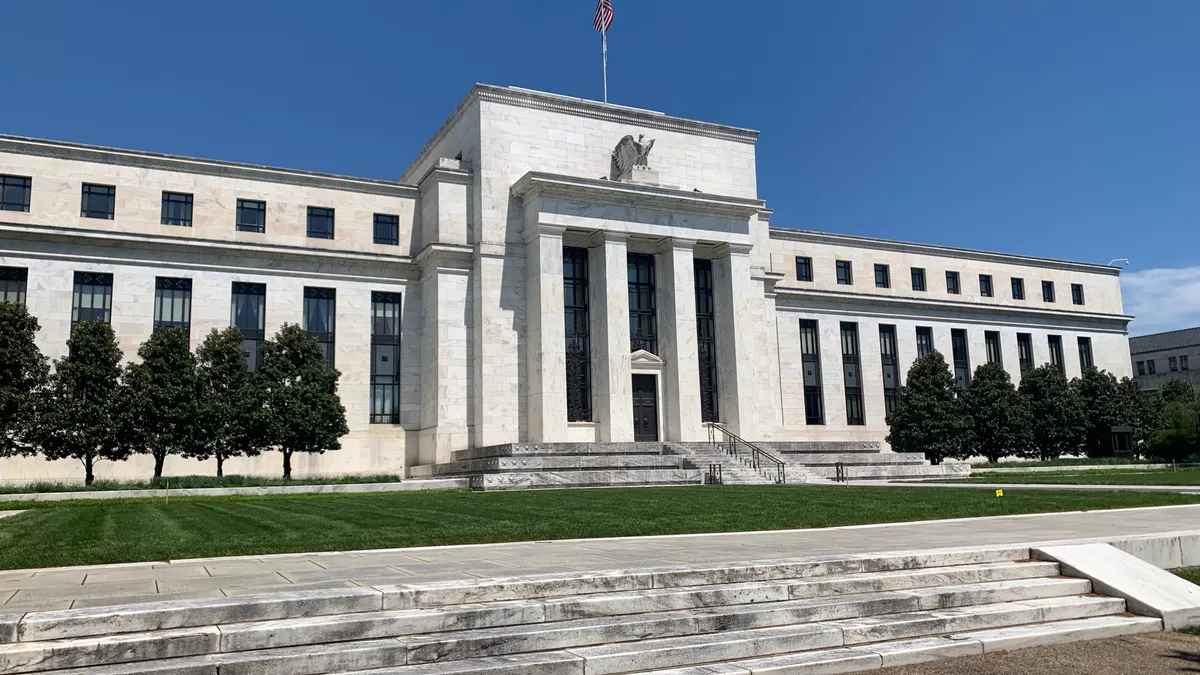The Federal Reserve has shown twice this week that it is open to applying its regulatory framework beyond the tidy little box where banks reside.
First, in comments to a fair-lending advocacy group Monday, Fed Chair Jerome Powell said the Community Reinvestment Act (CRA) should cover all companies providing consumer credit.
About 80% of all government-backed mortgages in December originated from nonbank mortgage companies, to which the CRA doesn’t apply, The Wall Street Journal reported, citing research from the Urban Institute. That figure is up from about 50% in 2014.
"Like activities should have like regulation," Powell told a National Community Reinvestment Coalition (NCRC) conference Monday, adding that lawmakers should have the final say.
"I like to think, though, that consumers require protection and low- and moderate-income communities require credit support, regardless of the nature of the institution," Powell said. "In terms of ... the specific question, that's really one for Congress to make a decision about."
Powell’s comments dovetail with promises from across the aisle to try to expand the CRA to cover nonbank mortgage and insurance companies — a vow President Joe Biden made while campaigning last year, and one buttressed Monday by Senate Majority Leader Chuck Schumer, D-NY.
"For years, the CRA has been crucial in making sure banks invest in low-income neighborhoods, provide mortgages, loans for small businesses and so many other things," he said in pre-recorded remarks to Monday’s NCRC conference, according to American Banker. "As we work to reform, modernize and hopefully expand the CRA, it'll be my number-one goal to refocus CRA's priorities to benefit those who truly need help."
To that end, Powell said Monday the Fed is reopening discussions with the Office of the Comptroller of the Currency (OCC) and the Federal Deposit Insurance Corp. (FDIC) to design a more unified revamp of the 1977 anti-redlining rule.
The OCC last May released a 372-page overhaul to the rule without Fed or FDIC support. The OCC’s CRA revamp creates new data collection requirements, evaluates banks based on areas where they have significant deposits rather than where their branches are, raises asset thresholds and adds a distinction between small and intermediate-sized banks. But it drew fire for being finalized just six weeks after the public comment period closed, leaving doubt as to how much feedback was actually considered.
Months later, the Fed proposed its own CRA revamp, which, among other things, would give greater CRA credit to banks that do more small-dollar lending in low-income communities rather than satisfying CRA requirements through a few large-scale projects.
FDIC Chair Jelena McWilliams last May said it was "not prepared to finalize the CRA proposal at this time" but that her agency "strongly supports the efforts to make the CRA rules clearer, more transparent, and less subjective."
Powell on Monday said the CRA "will be most effective if the three agencies get together with a consistent approach, and hopefully with identical or nearly identical rules."
"I would say that I believe we can make good progress with the other agencies now and that's certainly going to be our intent," he said. "We have discussions going on now and I feel that we will make progress."
That must foster hope with conference host the NCRC, which, for the record, called last year’s CRA revamp from the OCC "awkward, disjointed and rushed," and an "administrative fiasco."
Incidentally, 10 banking trade groups urged the OCC on Tuesday to formally withdraw its CRA rewrite or delay its effective date to at least 2025 from 2023, in anticipation that a Biden administration nominee for OCC chief would continue work to refine the rule.
Fintech charter guidance
The central bank aimed a second move at nonbanks Wednesday, publishing guidance that would give the Fed’s 12 regional banks the power to decide whether to grant fintechs access to the Fed system.
The guidance comes as an increasing number of nonbanks — particularly crypto firms such as Anchorage, Protego Trust Co. and Paxos — have received conditional approval for charters from the OCC despite not having deposit insurance.
The special-purpose charter the OCC unveiled in 2018 has drawn at least two legal challenges, and the question of whether companies that lack deposit insurance should be given access to the Fed system is so far unresolved.
The central bank Wednesday proposed that its regional satellites use six principles to determine Fed access for fintechs. Applicants must be eligible to maintain an account at a Federal Reserve bank and should not pose an "undue" credit, operational, settlement or cyber risk to the bank; the payment system; the U.S. financial system; to the economy due to money-laundering or terrorism financing concerns; or to the Fed’s ability to implement monetary policy, the central bank said.
"With technology driving rapid change in the payments landscape, the proposed Account Access Guidelines would ensure requests for access to the Federal Reserve payments system from novel institutions are evaluated in a consistent and transparent manner that promotes a safe, efficient, inclusive, and innovative payment system," Fed Gov. Lael Brainard said in a statement Wednesday.
The Fed is seeking public comment for 60 days on whether Wednesday’s guidelines address all necessary risks and are adequately clear, yet foster "responsible" innovation.
Of particular concern are capital requirements and risk management.
"If the institution is not subject to capital requirements similar to a federally-insured institution, the potential for sudden and significant deposit inflows into that institution is particularly large, which could disintermediate other parts of the financial system, greatly amplifying stress," the Fed wrote Wednesday.
Additionally, the Fed said, a company’s risk management framework should be subject to oversight by a board of directors and a state or federal banking supervisor.





















